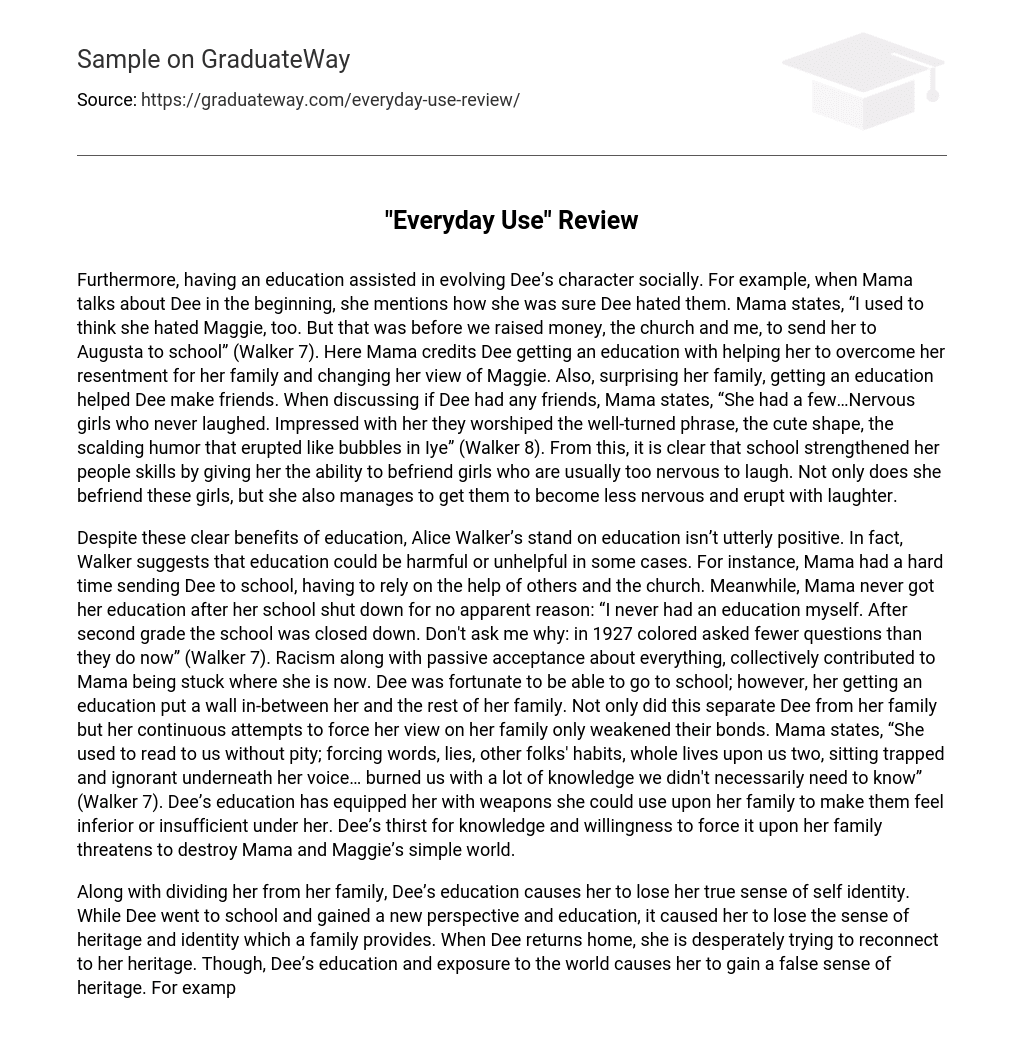Furthermore, having an education assisted in evolving Dee’s character socially. For example, when Mama talks about Dee in the beginning, she mentions how she was sure Dee hated them. Mama states, “I used to think she hated Maggie, too. But that was before we raised money, the church and me, to send her to Augusta to school” (Walker 7). Here Mama credits Dee getting an education with helping her to overcome her resentment for her family and changing her view of Maggie. Also, surprising her family, getting an education helped Dee make friends. When discussing if Dee had any friends, Mama states, “She had a few…Nervous girls who never laughed. Impressed with her they worshiped the well-turned phrase, the cute shape, the scalding humor that erupted like bubbles in Iye” (Walker 8). From this, it is clear that school strengthened her people skills by giving her the ability to befriend girls who are usually too nervous to laugh. Not only does she befriend these girls, but she also manages to get them to become less nervous and erupt with laughter.
Despite these clear benefits of education, Alice Walker’s stand on education isn’t utterly positive. In fact, Walker suggests that education could be harmful or unhelpful in some cases. For instance, Mama had a hard time sending Dee to school, having to rely on the help of others and the church. Meanwhile, Mama never got her education after her school shut down for no apparent reason: “I never had an education myself. After second grade the school was closed down. Don’t ask me why: in 1927 colored asked fewer questions than they do now” (Walker 7). Racism along with passive acceptance about everything, collectively contributed to Mama being stuck where she is now. Dee was fortunate to be able to go to school; however, her getting an education put a wall in-between her and the rest of her family. Not only did this separate Dee from her family but her continuous attempts to force her view on her family only weakened their bonds. Mama states, “She used to read to us without pity; forcing words, lies, other folks’ habits, whole lives upon us two, sitting trapped and ignorant underneath her voice… burned us with a lot of knowledge we didn’t necessarily need to know” (Walker 7). Dee’s education has equipped her with weapons she could use upon her family to make them feel inferior or insufficient under her. Dee’s thirst for knowledge and willingness to force it upon her family threatens to destroy Mama and Maggie’s simple world.
Along with dividing her from her family, Dee’s education causes her to lose her true sense of self identity. While Dee went to school and gained a new perspective and education, it caused her to lose the sense of heritage and identity which a family provides. When Dee returns home, she is desperately trying to reconnect to her heritage. Though, Dee’s education and exposure to the world causes her to gain a false sense of heritage. For example, when Dee changes her name to Wangero because of her newfound heritage: ‘Not ‘Dee,’ Wangero Leewanika Kemanjo…She’s dead…I couldn’t bear it any longer, being named after the people who oppress me” (Walker 9). Here shows how Dee’s knowledge of the world causes her to dissociate herself from both her family and southern roots, rejecting her American heritage in favor for her ancestral homeland of Africa. As an effect, she also rejects the line of strong women in her family who passed down valuable skills, traits, and traditions from generation to generation. In “Everyday Use,” Mama tells Dee that she was named after her aunt Dicie, who was named after Dee’s grandmother and great grandmother, and the name “Dee” goes back since before the Civil War (Walker 9-10). When Dee changed her name, she cuts herself off from her heritage and ends a tradition that goes back for more than three generations. Thus, removing Dee from her heritage, forcing her to look at her heritage as if she was looking at a piece of art.
In conclusion, “Everyday Use” reveals that education is a powerful thing. With an education, you could have more money and opportunities in life. Education granted Dee the ability to afford nice things and a choice to leave her home, unlike her family. However, there were also several downsides to Dee’s education. For example, Dee’s education plays a fundamental role in separating her from her heritage and family. In short, when only one person out of a community becomes educated, it may cause more harm than benefits.





